
Language and Cognition
Scope & Guideline
Exploring the Intersection of Language and Mind
Introduction
Aims and Scopes
- Bilingualism and Cognitive Processing:
The journal investigates how bilingualism affects cognitive functions such as memory, executive control, and decision-making, emphasizing the cognitive advantages or disadvantages associated with bilingual experiences. - Neuroscientific Insights into Language Use:
It includes studies utilizing neuroimaging techniques (e.g., ERP, fMRI) to uncover the neural correlates of language processing and bilingual language control, providing a biological perspective on language cognition. - Cross-Linguistic Influence:
Research often examines how languages interact within bilinguals, including cross-linguistic effects on lexical retrieval, phonological processing, and syntactic structures, shedding light on the complexities of multilingual language use. - Language Acquisition in Bilingual Contexts:
The journal addresses language development, particularly in children, focusing on the processes involved in acquiring multiple languages and the factors influencing heritage language maintenance. - Socio-Cultural Dimensions of Bilingualism:
It explores the impact of social and cultural contexts on bilingual language use and cognitive performance, emphasizing the importance of individual differences in language experience.
Trending and Emerging
- Impact of Technology on Language Learning:
There is a growing interest in how digital tools and technology influence language acquisition and cognitive processes, with research examining the benefits and limitations of digital language learning methodologies. - Emotional and Moral Decision-Making in Bilinguals:
Recent studies are increasingly exploring the emotional dimensions of bilingualism, particularly how language influences moral judgments and emotional processing, highlighting the interplay between language and affective factors. - Neuroplasticity and Bilingualism:
Emerging research focuses on the neuroplastic changes associated with bilingualism, exploring how lifelong bilingual experiences shape brain structure and function, particularly in relation to cognitive reserve. - Individual Differences in Bilingual Experience:
There is a trend towards examining the variability in bilingual experiences and how individual differences (e.g., proficiency, age of acquisition) affect cognitive outcomes, emphasizing personalized approaches to bilingual education. - Cross-Modal Language Processing:
Studies are increasingly investigating how different modalities (e.g., auditory, visual, gestural) interact in bilingual language processing, providing a more comprehensive understanding of language use in diverse contexts.
Declining or Waning
- Focus on Monolingual Language Processing:
There has been a noticeable decrease in studies solely focusing on monolingual language processing, as the journal increasingly emphasizes bilingual and multilingual contexts, reflecting the growing interest in the cognitive implications of bilingualism. - Traditional Language Learning Methods:
Research centered on conventional language learning approaches is becoming less frequent, as the journal shifts towards exploring innovative methodologies, including digital language learning and immersive environments. - Aging and Language Interaction:
While aging and its effects on bilingualism were once a significant focus, recent publications indicate a waning interest in this area, possibly due to the saturation of existing literature and a pivot towards more dynamic interactions in younger populations.
Similar Journals
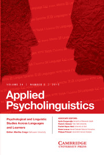
APPLIED PSYCHOLINGUISTICS
Exploring the Nexus of Language and MindApplied Psycholinguistics, published by Cambridge University Press, is a premier journal in the fields of linguistics, psychology, and cognitive science, with a focus on the intersection of language and psychological processes. Since its inception in 1980, the journal has consistently provided a platform for high-quality research, achieving impressive rankings in various categories as of 2023, including Q1 status in Linguistics and Language, and Q1 in Psychology (miscellaneous). With a focus on experimental and cognitive psychology, it fosters the exploration of language acquisition, social communication, and cognitive mechanisms underlying language use. Although it is not available as an Open Access journal, its rigorous peer-review process and impactful articles make it a significant resource for researchers, professionals, and students alike. The journal's commitment to advancing knowledge is evident through its contributions to both theoretical and applied psycholinguistic research. Whether you're a seasoned researcher or a student eager to delve into psycholinguistics, this journal serves as an essential resource for keeping abreast of cutting-edge developments in the discipline.
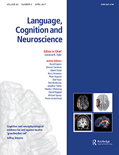
Language Cognition and Neuroscience
Fostering Interdisciplinary Dialogue in Language and NeuroscienceLanguage Cognition and Neuroscience is a premier peer-reviewed journal published by ROUTLEDGE JOURNALS, TAYLOR & FRANCIS LTD, focusing on the intersection of linguistics, cognitive psychology, and neuroscience. Since its inception in 2013, this journal has established itself as a vital resource for researchers and scholars, contributing significantly to the understanding of how language is processed and represented in the brain. With its impressive rankings in various categories—Q1 in Linguistics and Language, Q2 in Cognitive Neuroscience, and Experimental and Cognitive Psychology—it caters to a diverse and interdisciplinary audience. The journal is accessible to readers worldwide, effectively communicating cutting-edge research and innovative methodologies in the field. Open Access options enable broader disseminations of knowledge, ensuring that significant findings reach both academic and practical applications. With a commitment to high-quality research, Language Cognition and Neuroscience continues to be an influential platform for advancing theories and practices within cognitive science and language studies.

Rivista di Psicolinguistica Applicata-Journal of Applied Psycholinguistics
Advancing Knowledge in Psycholinguistics.Rivista di Psicolinguistica Applicata - Journal of Applied Psycholinguistics is a distinguished journal dedicated to exploring the intersections of psychology and linguistics, making significant contributions across various subfields of psycholinguistics and its applications. Published by Fabrizio Serra Editore in Italy, this journal presents a repository of innovative research, theoretical advancements, and practical applications relevant to developmental and educational psychology, linguistics, and social psychology. Although currently listed in Q4 for Developmental and Educational Psychology and Q4 for Social Psychology, the journal has achieved a respectable Q3 ranking in Linguistics and Language, reflecting its commitment to enhancing understanding within these realms. With an E-ISSN of 1724-0646, the journal facilitates accessibility to its content, empowering scholars and practitioners to stay abreast of emerging trends and findings. The impact factor of the journal is poised for growth as it seeks to amplify its reach and influence within the academic community, appealing to researchers, professionals, and students who have a vested interest in the dynamic field of applied psycholinguistics.
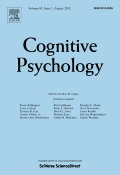
COGNITIVE PSYCHOLOGY
Unraveling the Mysteries of the MindCOGNITIVE PSYCHOLOGY is a premier academic journal published by Academic Press Inc. Elsevier Science, specializing in the dynamic and evolving field of cognitive psychology. With a significant history spanning from 1970 to 2024, this journal has established itself as a critical resource for researchers and professionals alike, boasting a distinguished ranking in the Q1 category across multiple disciplines, including Experimental and Cognitive Psychology, Neuropsychology, and Artificial Intelligence. Its impact factor, reflective of its influence and reputation within the academic community, positions COGNITIVE PSYCHOLOGY as an essential platform for disseminating cutting-edge research and theoretical advancements. Although it is not open access, subscribers gain exclusive insights into the latest findings that drive the field forward. The journal's commitment to fostering innovative research makes it an indispensable tool for those dedicated to understanding the complexities of human cognition.
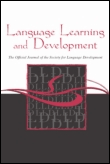
Language Learning and Development
Illuminating the path to language learning excellence.Language Learning and Development, published by Routledge Journals, Taylor & Francis Ltd, is a premier academic journal that stands at the forefront of research in the fields of education and linguistics. With a robust ISSN of 1547-5441 and E-ISSN 1547-3341, this journal not only boasts an impressive Q1 classification in both Education and Linguistics for 2023 but also ranks favorably in Scopus metrics, highlighting its significance in advancing scholarship. Situated in the United Kingdom, it focuses on the intersection of language acquisition, cognitive development, and pedagogical practices, making it an essential resource for researchers, educators, and students alike. Given its commitment to publishing rigorous research articles, Language Learning and Development aims to foster dialogue and explore innovative methodologies in language learning, providing an invaluable platform for contemporary issues and advancements in this dynamic field.
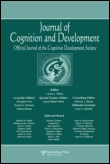
Journal of Cognition and Development
Pioneering research in developmental trajectories and mental health.Welcome to the Journal of Cognition and Development, an esteemed publication under the umbrella of ROUTLEDGE JOURNALS, TAYLOR & FRANCIS LTD. With an established history since 2000, this journal serves as a pivotal platform for researchers, educators, and practitioners in the fields of Developmental and Educational Psychology, Experimental and Cognitive Psychology, and Psychiatry and Mental Health. Holding a respectable Q2 status in several categories as of 2023, it showcases cutting-edge research and critical reviews that advance our understanding of cognitive processes and developmental trajectories across diverse populations. Although access is not open, the journal maintains rigorous standards of quality and relevance, uniquely positioning itself within the competitive realm of psychological research. With its insightful contributions and dynamic discourse, the Journal of Cognition and Development continues to impact both academic and practical applications, making it an essential resource for scholars and practitioners alike.

BRAIN AND LANGUAGE
Illuminating the Interplay Between Language and Brain FunctionBRAIN AND LANGUAGE is a premier journal published by Academic Press Inc Elsevier Science, dedicated to fostering scholarly communication in the fields of Cognitive Neuroscience, Linguistics, Psychology, and Speech and Hearing. With its ISSN 0093-934X (Print) and 1090-2155 (Online), the journal has established a significant presence since its inception in 1974, continuing to provide valuable insights into the intricate relationship between brain function and language processing. This journal is highly regarded, boasting a 2023 ranking of Q1 in Linguistics and Language, reflecting its influential contributions to the field, alongside Q2 rankings in categories such as Cognitive Neuroscience and Experimental Psychology. With a rigorous peer-review process, it serves as an essential resource for researchers and professionals seeking to deepen their understanding of language mechanisms and their cognitive underpinnings. Despite not being an Open Access journal, BRAIN AND LANGUAGE ensures that its articles are widely accessible and of high quality, making it an indispensable platform for both emerging and established scholars aiming to expand the boundaries of research in language and cognition.
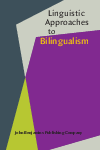
Linguistic Approaches to Bilingualism
Decoding the Dynamics of Bilingual CommunicationLinguistic Approaches to Bilingualism, published by John Benjamins Publishing Co, stands as a leading journal in the field of linguistics, particularly recognizing the complexities and nuances of bilingualism. Established in 2011, this journal has quickly risen to prominence, achieving a Q1 ranking in Linguistics and Language as of 2023, underscoring its impact and relevance within the academic community. With an impressive Scopus ranking that places it in the top 12% and 13% in the Arts and Humanities and Social Sciences categories respectively, it is an essential resource for researchers, professionals, and students alike. The journal aims to publish innovative and interdisciplinary research that contributes to a deeper understanding of bilingual language processing, acquisition, and usage, making it invaluable for those studying the interplay of language and cognition. Although it does not currently offer open access options, its rigorous peer-review process ensures that each publication meets the highest academic standards, fostering insightful discussions and advancements within the field.

Cognitive Studies-Etudes Cognitives
Connecting Theory to Practice in Cognitive ResearchCognitive Studies-Etudes Cognitives, published by the Polish Academy of Sciences, Institute of Slavic Studies, is a prominent open-access journal based in Poland, dedicated to advancing research in the interdisciplinary fields of cognitive studies, communication, and linguistics. Since its inception, the journal has made a significant impact in the academic community, evidenced by its ranking in the Scopus database within the top 30% for Language and Linguistics. With an aim to bridge theoretical insights and practical applications, Cognitive Studies invites contributions that explore the complex interplay between language, cognition, and technology, making it a vital resource for researchers, professionals, and students alike. As the journal continues to grow, it remains committed to maintaining rigorous standards for publication while fostering an inclusive environment for innovative ideas and diverse perspectives. The journal is easily accessible and aims to facilitate knowledge dissemination, proudly offering open access since 2014.

PSYCHOLOGIA
Connecting Minds through Groundbreaking ResearchPSYCHOLOGIA is a distinguished academic journal published by the Psychologia Editorial Office, focusing on the broad field of psychology. Originating from Japan, the journal serves as a platform for innovative research and insights into various psychological phenomena, contributing significantly to the advancement of psychological knowledge since its establishment in 1996. With an ISSN of 0033-2852 and an E-ISSN of 1347-5916, PSYCHOLOGIA primarily targets researchers, professionals, and students who are passionate about the intricacies of human behavior and cognition. Currently categorized in the Q4 quartile of psychology (miscellaneous) based on 2023 metrics, it holds a Scopus rank of #157 out of 216, indicating its developing presence within the academic community. Despite being published without open access options, the journal remains committed to fostering scholarly dialogue and disseminating significant findings that shape contemporary psychological research. As it converges towards its issue set for 2024, PSYCHOLOGIA continues to be an essential resource for those seeking to deepen their understanding of psychological sciences.